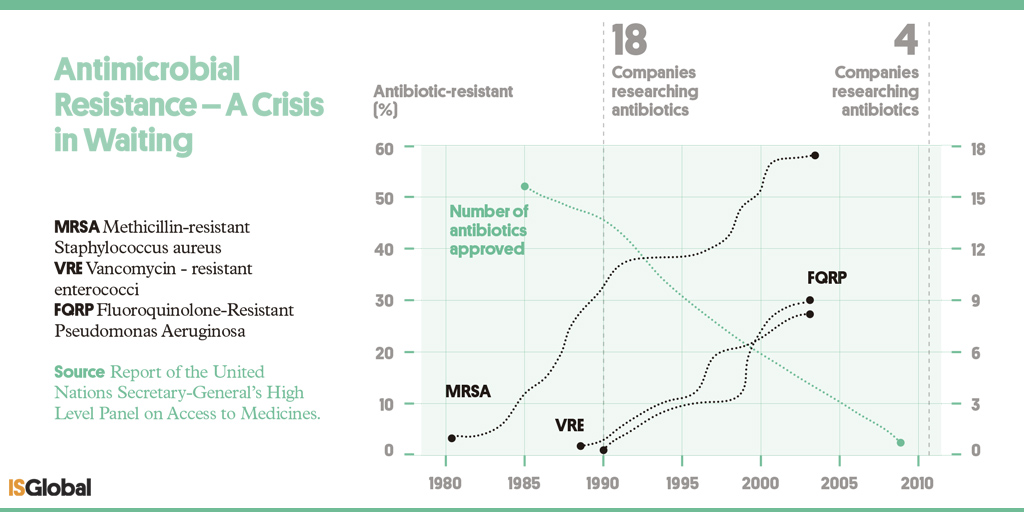Antibiotic Resistance Draws Attention to the Need to Reform the Obsolete Model for Pharmaceutical Innovation
A new report by ISGlobal calls for public sector intervention to find a solution for the problem of antimicrobial resistance
09.05.2017
The Department of Policy and Global Development at ISGlobal, an institute supported by the ”la Caixa” Foundation, today presented a report entitled Antibiotic Resistance: Not Just a Problem of Patents. The report warns of the health threat posed by the lack of new antibiotic agents, analyses how antimicrobial resistance pushes the model of innovation and access to medicines to the limits of its efficacy, and calls for public sector intervention to find a sustainable solution.
In the absence of new antibiotics to provide alternatives to those currently in use, we are starting to lack the tools we need to deal with the resistance to treatment that now characterises certain common infections. Proof that a problem exists is demonstrated by the fact that only two compounds from new classes of antibiotics have been approved in the last 30 years. As a result, there is a high risk that resistant pathogens will cause complications that may ultimately cause the death of the patient. Today, more than 50,000 people die every year in Europe and the United States as a result of resistant infections. In fact, according to some analysts, if antibiotic resistance continues to increase at the current rate, the number of people who will die as a result of resistant infections in 2050 will be ten times current figures, higher than the death rate attributable to cancer today.

The pharmaceutical industry is not investing sufficient funds in researching new antibiotics because the financial incentives for them to do so are lacking. The market for a new antibiotic is usually small (because they are only used to treat patients who develop resistant infections) and the duration of treatment is short. These two factors reduce the interest of the private sector in producing new antimicrobials.
“Unless there is a decisive public intervention to compensate for the lack of the incentives that drive private innovation, the problem will only get worse in the coming years” warns Gonzalo Fanjul, ISGlobal’s Policy Director and one of the authors of the report.
The authors firmly maintain that financial and legislative intervention on the part of the public sector is a necessary precondition to any sustainable solution to the problem. Over the last decade, the World Health Organisation (WHO) has led a debate seeking answers to the problem. In 2015, it presented a Global Action Plan on Antimicrobial Resistance that calls for public intervention to ensure that the R&D needed to produce new antibiotics is undertaken. At the same time some countries, such as Germany and Holland, are leading international initiatives aimed at speeding up the search for solutions to antibiotic resistance.
However, in the opinion of Elena Villanueva Olivo, another of the report’s authors, “it is important not to treat antibiotics as a special case because they are not the only type of drugs affected by the failure of the market-driven model. There are other cases, such as the drugs and vaccines for neglected diseases, for example, that are affected in the same way, so what we really need is a new model for innovation that does not depend solely on the interests of pharmaceutical companies.”
Jordi Vila, the Director of ISGlobal’s Antimicrobial Resistance Initiative and Head of the Department of Clinical Microbiology at the Hospital Clínic de Barcelona, underscores the fact that the conclusions of the analytical report are backed by ISGlobal’s experience in this field. “There is an urgent need to reactivate R&D efforts to find new antimicrobial agents and the problem must be addressed using a multidisciplinary approach that can also take into account socioeconomic factors and human behaviours.”



